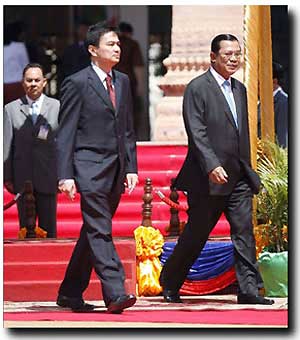
Farmer’s Insurance: China Turns to the Countryside
November 9, 2009
APEC Cool on Climate Change
November 19, 2009By: Project 2049 Institute |
Just weeks after Asian leaders waxed eloquent about unity at the 15th ASEAN Summit in Bangkok, a simmering diplomatic row between Southeast Asian neighbors Thailand and Cambodia threatens to boil over and tear efforts at regionalism asunder.Â
Â
The dispute erupted when Cambodian Prime Minister Hun Sen decided to appoint fugitive former Thai premier and his longtime friend Thaksin Shinawatra as an economic adviser. The move rankled Bangkok, which views the appointment of a convicted Thai citizen as interference in its internal affairs.Â
Â
Both countries have since recalled their respective ambassadors, scrapped bilateral agreements on offshore resource exploration, triggered military alerts in border hotspots, and threatened to further downgrade relations. Analysts say the relationship is at its lowest ebb since mid-2008, when the two countries exchanged deadly fire over the disputed Preah Vihear temple, killing more than a dozen troops.Â
Â
But even if the cross-border saber-rattling continues, few expect it to descend into full-scale violence or all-out war. The Cambodian leadership habitually stirs up international imbroglios to score domestic political points, and this case is likely no different. Mr. Hun Sen’s remarks on the sidelines of the ASEAN summit last month indicate that the ‘Thaksin gambit’ is merely retaliation for Bangkok allowing Cambodian opposition leader Sam Rainsy to deliver a searing rebuke of government policy at the Foreign Correspondent’s Club in September, rather than a deliberate attempt to vex Thailand. With Thailand’s interior minister Chavarat Charnvirakul bearing the olive branch earlier this week and broaching the topic of talks, the bilateral spat is probably headed to the negotiating table instead of the battlefield.Â
Â
Robust economic relations will also likely inch along even if these prickly historical animosities do persist. Thailand has provided tens of millions of dollars to Cambodia in grants and loans since the mid-1980s for infrastructure development. And despite the barbs traded over ancient temples last year, bilateral trade surged from US$ 1.4 billion in 2007 to US$ 1.8 billion in 2008.Â
Â
The regional implications of the squabble are more sobering. The longer it continues, the more it will damage ASEAN’s credibility as a united organization behind the wheels of regional integration. The timing is also particularly inopportune, as the group will look feckless and divided just as U.S. President Barack Obama visits the region later this week and both the Asia-Pacific Economic Cooperation (APEC) summit and the inaugural ASEAN-US Leaders Meeting are held this weekend. ASEAN’s own Secretary General Surin Pitsuwan admits that “ASEAN cannot afford to be seen as being so seriously dividedâ€.Â
Â
But unless the Thailand-Cambodia dispute is resolved over the next few days, the specter of mutual hostility will loom large even as Asian leaders air their trite encomiums on unity this weekend.




